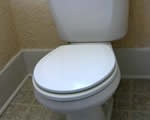 Go to main content
Go to main content
Archive Website of the UK government
Please note that this website has a UK government accesskeys system.
Main menu
Page menu
Environment and greener living

Greener ways to clean

More than £1 billion is spent in the UK on cleaning products each year. Find out how you can reduce your impact on the environment when you clean. Easy actions like looking for the Ecolabel, using the right amount of product and buying concentrated versions can all help.
How chemicals affect the environment
Many chemicals used in the home are very valuable. Some however, like phosphates in detergents, can cause damage to the environment if they reach high levels.
Household waste water from sinks, toilets, washing machines and baths drains into sewers. This waste water then flows to treatment works, and afterwards to rivers, lakes and seas.
Most chemicals get removed during treatment, but some inevitably end up in rivers and the sea where they can harm wildlife.
What cleaning products should you buy?
Some things to think about when buying cleaning products are:
- the European Union (EU) Ecolabel guarantees that a product is less harmful to the environment than other similar products
- choosing concentrated products helps the environment by saving on packaging and transport
- buying refill systems also helps cut down on packaging
Cleaning your clothes
Much of the environmental impact of doing your laundry comes from how you use products. Try these simple tips:
- be sparing with your washing detergents – only use the recommended dose for the hardness of water in your area
- wash clothes at 30 degrees to save energy – it’s just as effective for normally soiled clothes
- wait until you have enough clothes for a full load, as two half loads use more energy and water than one full load
- if you can, save energy by drying clothes on a line outside rather than tumble drying
- where there’s a choice, machine wash rather than dry-clean clothes, as some dry-cleaning chemicals are toxic and contain substances that damage ozone
Cleaning round the house
There are some easy ways to reduce your environmental impact when you’re cleaning in your house. Some could even save you time and money:
- only use the recommended amount of cleaner for the hardness of water in your area
- make sure you have a full load when using a dishwasher
- try not to clean excessively – dirt can often be wiped up with a cloth and water, without the need for cleaning products
- using a broom or dustpan and brush to sweep up, instead of a vacuum cleaner, will save energy
- empty or change vacuum bags regularly, so the vacuum works more quickly and efficiently
Store and dispose of products carefully
Read the label and follow the proper storage and disposal advice for cleaning products. Never pour them down the drain unnecessarily – remember that your drainage ends up in seas and rivers.
If you don't know how to dispose of a product, your local civic amenity site (waste and recycling centre) can get rid of it safely. Your council can tell you the location and opening times of your local site.
Recycle whenever you can
Recycle plastic, cardboard and metal packaging according to the product label. Recycling reduces the use of new materials and saves energy, as well as cutting down on the need for landfill. To find out more about recycling, use the link below to ‘Recycling at home’.
Useful contacts
In this section...
- Greener furniture, fittings and flooring
- Electrical goods: greener choices
- Clothing: greener choices
- Buying flowers and plants: greener choices
- Buying recycled products
- Food and drink: greener choices
- Water: using less at home
- Greener DIY
- Greener packaging choices
- Choosing 'green' companies
- Shoppers: ways to be greener
- Being greener at home: a quick guide
 Facebook
Facebook Twitter
Twitter StumbleUpon
StumbleUpon Delicious
Delicious Reddit
Reddit
